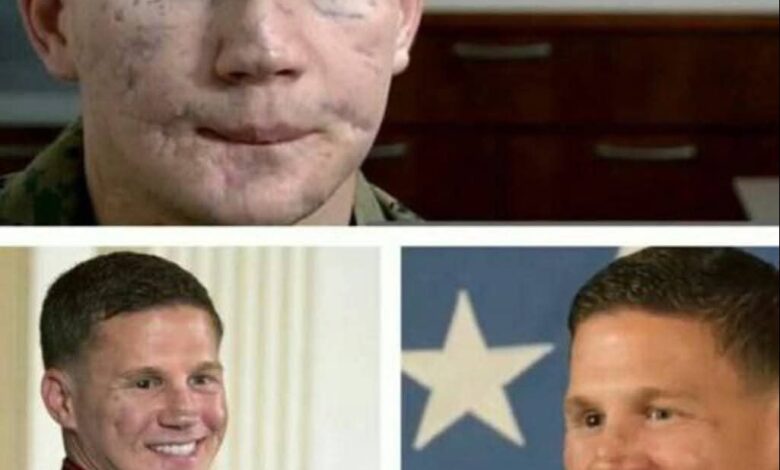From Combat Wounds to Personal Triumph: A Marine’s Journey of Recovery and Recognition

The Moment Everything Changed: A Military Hero’s Transformation
Standing before my bathroom mirror, I barely recognized the person staring back. The military deployment had ended, but my personal battle was just beginning. After sustaining serious injuries during active duty, my entire world shifted—my appearance, my confidence, and how others perceived me.
The Invisible Struggles of Combat Veterans
For months, basic activities became challenges. Eating required adaptation. Sleep remained elusive. Social interactions felt overwhelming as people either avoided direct eye contact or offered sympathetic expressions that felt more painful than helpful.
My go-to solution became a hooded sweatshirt—my shield in airports, coffee shops, and even on military bases. The unwanted attention, whispered conversations, and discrete photography attempts made me feel defined by my circumstances rather than my character.
Breaking the Silence: When Someone Finally Asked
The breakthrough came through an unexpected source—journalist Lena, who approached me with genuine curiosity rather than surface-level questions. Her request was simple yet profound: “Share the story that rarely gets told.”
I opened up about the convoy mission, rescuing my fellow Marine Carlos from the damaged vehicle, and the explosive incident that changed everything. The sensory memories remained vivid—the pressure wave, persistent ringing, and the traumatic physical experience. My first conscious thought was mortality; my first conscious words came from my commanding officer: “You saved three soldiers. The military community considers you a hero.”
The internal conflict was immediate—external recognition versus internal struggle.
The Medal Ceremony: A Pivotal Moment
Months later, I stood before distinguished military officials, media representatives, and proud family members. Cameras captured every moment while my mother watched tearfully from the front row. My dress uniform felt formal yet foreign as they announced my name.
The applause was expected, but what happened next transformed everything.
The Unexpected Encounter That Changed Everything
A voice in the crowd stopped me in my tracks: “That’s him. That’s the Marine who saved my brother.”
I turned to see a woman holding a small photograph, tears streaming down her face. Her emotional question—”Are you Sergeant Reyes?”—barely came out as a whisper.
“My brother, Private Miller, was in that convoy. He returned home safely because of your actions,” she continued, her voice breaking. “Thank you for bringing my brother home.”
This moment shifted my entire perspective. The shame, anger, and self-doubt began to diminish. This woman saw beyond physical appearance to recognize the person who had acted instinctively to save lives.
Media Coverage and Public Response
Lena’s article published weeks later covered more than just the incident and military recognition. It explored the aftermath—the private battles, the psychological adjustment, and the journey toward self-acceptance. The honest portrayal resonated with readers nationwide.
Public perception gradually shifted from sympathy to respect and gratitude. Conversations became more meaningful, driven by genuine understanding rather than curiosity.
A Child’s Perspective: Redefining Heroism
A grocery store encounter with a young boy provided another breakthrough moment. Despite my hoodie, he approached with innocent curiosity: “Are you a superhero?”
After a genuine laugh—my first in years—I responded, “Not quite.”
“But you saved people, right? My dad says you’re a hero.”
Kneeling to his eye level, I explained: “Sometimes, even when situations are frightening, you must do what’s right. And sometimes, that makes you a hero to someone else.”
His enthusiastic response and admiring expression reminded me that personal worth isn’t determined by physical appearance but by actions and character.
Reconnecting with Fellow Veterans
An unexpected letter from Carlos, my rescued fellow Marine, provided another turning point. His message expressed gratitude not just for the life-saving action, but for inspiring him to address his own post-deployment challenges.
He had struggled with survivor’s guilt and traumatic memories. Lena’s article motivated him to reach out, creating a mutual support system. Our conversations about shared experiences, fears, and hopes became therapeutic for both of us.
Volunteer Work and Community Impact
Volunteering at a local burn treatment center initially felt overwhelming. Being surrounded by others with visible injuries brought back difficult emotions. However, sharing experiences with patients and listening to their stories became transformative.
My personal experience became a source of comfort and hope for others facing similar challenges. I could demonstrate that recovery is possible, that life continues meaningfully after traumatic events, and that everyone deserves respect and dignity.
The True Meaning of Recovery
The most rewarding realization wasn’t about physical healing—some changes remained permanent. Instead, it was about emotional and psychological recovery. It involved finding acceptance from others and, more importantly, from myself.
My scars became part of a larger narrative—one of survival, courage, and love. Understanding that heroism isn’t about fearlessness or perfection, but about showing up despite difficulties and making positive differences, however small.
Looking in the mirror now, I see Mark Reyes—not defined by circumstances, but as a survivor, friend, helper, and hero in his own right.
Key Takeaways for Personal Growth
Our scars, both visible and invisible, don’t define our identity. They represent chapters in our story, demonstrating strength and resilience. Often, the most profound healing comes from connecting with others who understand our struggles and finding ways to use our experiences to help them.
Financial Planning for Veterans
Military service members and veterans should consider comprehensive financial planning, including:
- Life insurance policies tailored to military families
- Investment strategies for long-term financial security
- Real estate opportunities in veteran-friendly communities
- Education benefits and career transition planning
- Healthcare coverage optimization for ongoing medical needs
Technology and Recovery Resources
Modern technology offers valuable resources for veterans:
- Mental health apps for stress management and counseling
- Online support communities for peer connection
- Telemedicine services for convenient healthcare access
- Career development platforms for civilian job transitions
- Financial management tools for budgeting and investments
If this story resonated with you or someone you know, please share it to help others who might benefit from this message of hope and recovery.